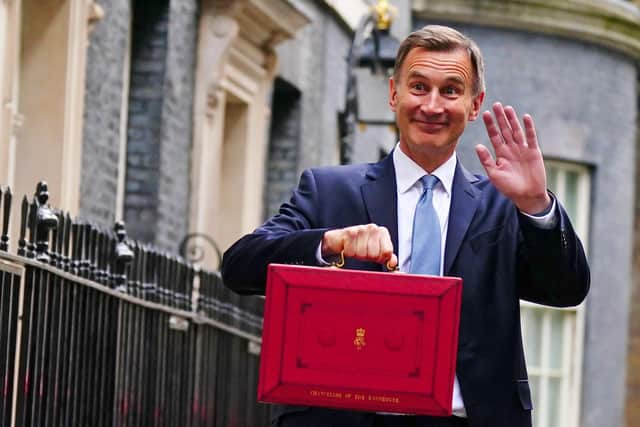Why Britain must heed the IMF’s warnings about our finances before indulging in tax cuts - Andy Brown
There is however, one rather significant excuse. The job of the International Monetary Fund is to step in and rescue countries that get themselves into financial difficulties.
When it spots signs that this is likely to happen it has a responsibility to issue a warning. Because if that nation gets it wrong then it will have to go cap in hand to the IMF to ask for a lot of money and it is better for the world’s banker of last resort to speak up before things reach that sorry state.
Advertisement
Hide AdAdvertisement
Hide AdSo, the IMF has looked long and hard at the situation in Britain and issued a few words to the wise. They think it is not a great idea to indulge in tax cuts when the country is already struggling to fund some of the most basic public services and the cost of those is almost certain to rise further.


In essence what the IMF has told us is that it looks to a neutral outside observer like there are unavoidable bills coming our way if we want to have our bins collected, be looked after when we are ill, have our children taught and keep the trains running. They are warning us that international financial markets might take a dim view of a series of pre-election tax giveaways, when there are some nasty post-election bills coming our way.
You remember financial markets. They are what reacted so swiftly to the economic wisdom of Liz Truss when she decided to ignore them and push ahead with a reckless rush to achieve economic growth that she didn’t have the money to fund.
Markets tend to react badly when they see a nation giving out money in tax cuts at a time when it has huge debts. In such circumstances markets push up interest rates and leave people with horrible increases in their mortgages and rents.
Advertisement
Hide AdAdvertisement
Hide AdThose markets also sell off the pound and leave people paying a lot more for food and fuel imports triggering price rises and then wage demands.
To hard-headed economists it is only a few short months since Britain suffered a beating for adopting reckless policies and it is all too easy for the same thing to happen again in slightly slower motion.
Britain has a mountain of debt that is going to challenge any government. The British government owes almost as much as the country earns in an entire year.
That might not be a problem if we had built that debt by investing heavily in the long-term future of the country and we had acquired some good solid assets that would drive economic prosperity.
Advertisement
Hide AdAdvertisement
Hide AdUnfortunately, our country has been depending heavily on huge amounts of one-off unearned income from exploiting oil and gas reserves in the North Sea and instead of investing that money wisely, like Norway did, it has been squandered. We are coming to the end of the money from fossil fuels at a time when we have run down public services and hefty debts. There is little sign of a carefully thought through more dependable economic strategy for the future. That sort of thing makes objective outside observers very nervous indeed.
On top of that government debt there is a huge mountain of private debt. British households used to be famed for the wisdom with which they managed personal finances. We were not a nation that liked maxing out the credit card. Not any longer. The average adult in the UK owes over £33,000.
Instead of helping people to carefully manage their way out of any excesses in acquiring debt, the British government has taken the unusual approach of allowing the gambling ‘industry’ virtually free reign.
Just one single gambling company, Bet 365, takes over £2bn a year out of the pockets of its customers. It is possible that these people have had fun and entertainment that is worth every penny of the losses they have experienced.
Advertisement
Hide AdAdvertisement
Hide AdIt is also possible that some of the least well-off sections of our communities have been plunged into extra misery by chasing the illusion that they can escape from their problems by the next bet.
On top of all this, we have businesses going to the wall at the highest rate for 30 years. Last year over 25,000 businesses went bankrupt.
Thousands of people who invested their own time and money, worked hard and took what seemed like sensible risks have had their plans wrecked by high interest rates and high costs that were largely triggered by the irresponsible actions of the British government.
The IMF is therefore entirely wise to advise us that there is no magic money tree and to beware of pre-election tax giveaways. There are some hefty bills lurking in the shadows and the generosity of a Chancellor before an election has a nasty tendency to turn into a fresh drive for austerity after it.
Andy Brown is the Green Party councillor for Aire Valley in North Yorkshire.
Comment Guidelines
National World encourages reader discussion on our stories. User feedback, insights and back-and-forth exchanges add a rich layer of context to reporting. Please review our Community Guidelines before commenting.